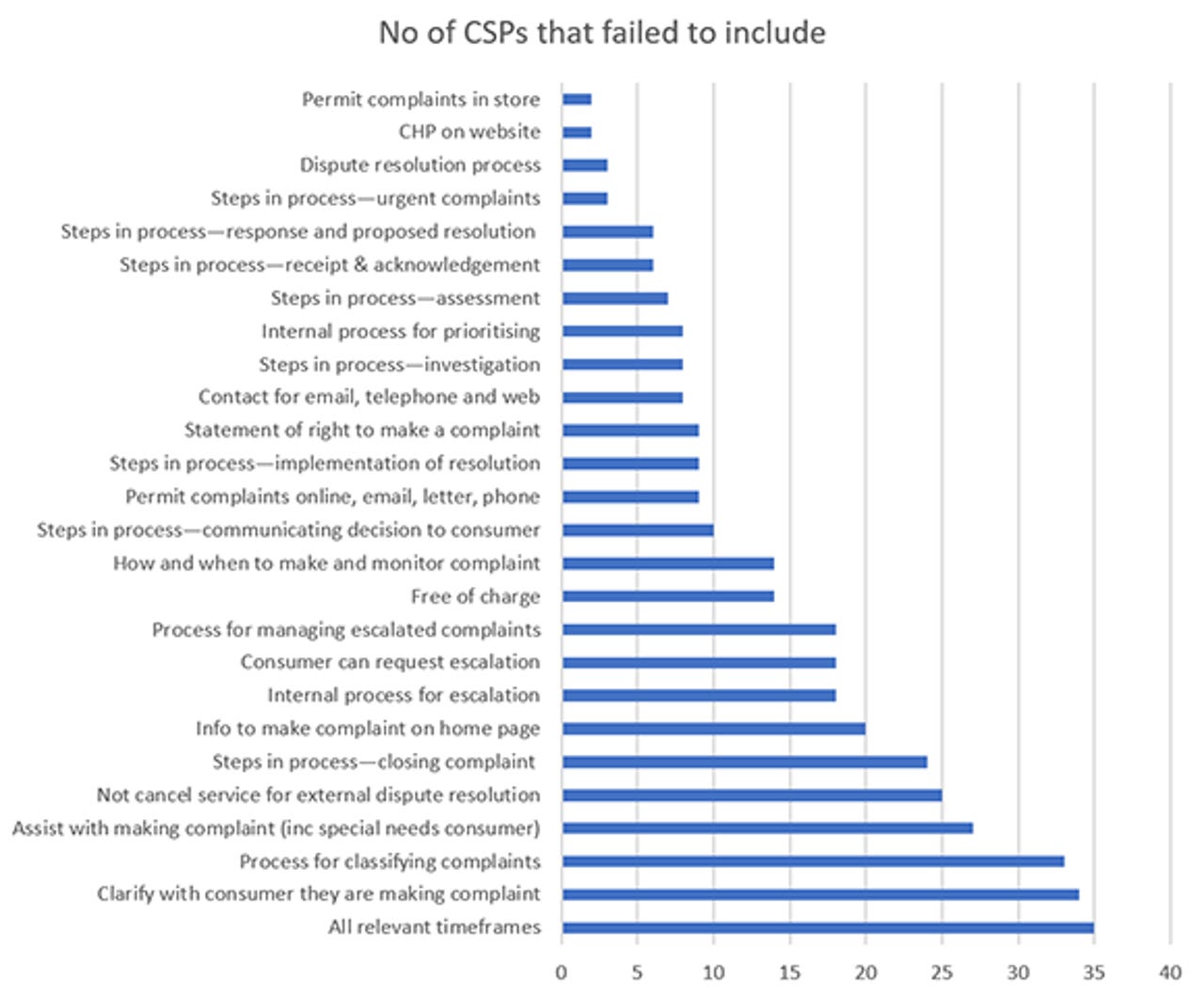ACMA: 41 telcos failed NBN complaints process audit


The Australian Communications and Media Authority (ACMA) has revealed that 41 telcos were not providing consumers with the minimum complaints-handling information required under a new National Broadband Network (NBN) standard.
Between July and September, the ACMA said it increased its audit and compliance activities, launching 59 new investigations, 41 of which were related to the new standard that came into effect in July.
Of these 41 telcos, two had no written complaints-handing processes on their websites; seven had "substantial deficiencies in their written processes" numbering 15 or more; and multiple did not classify their complaints or have processes for classification set out.
"Telco consumers need easy access to information about how to make a complaint and how their telco will handle that complaint. They also need to be confident that their problems will be dealt with promptly and effectively," said ACMA Chair Nerida O'Loughlin.
"While many providers moved swiftly to rectify the shortcomings identified by the ACMA's audit, it is clear that not all customers are receiving the service required by the standard.
"We will now consider formal action against the telcos that continue to fail to comply."
The report also detailed how three telcos -- Digital Technologies and Telecommunications, Vocal Channels, and Southern Phone -- were directed to comply with the Telecommunications Consumer Protections (TCP) Code; three telcos -- MyRepublic, Peak Connect, and Red Telecom -- were formally warned to comply with the TCP Code; Telstra was given remedial direction over its priority assistance obligations and failed to put through 1,400 Triple Zero calls; and Lycamobile was fined AU$12,600 after failing to comply with the TCP Code.
In August, the ACMA announced being able to directly enforce its new NBN migration rules, with the federal government agency's powers backed up by the ability to commence court proceedings to seek injunctions and civil penalties of up to AU$10 million.
Publishing its compliance and enforcement statement of approach that month, the ACMA said the new regulations will ensure consumers have better access to information on NBN services, are given backup options if services are not working, and have complaints addressed faster and more effectively.
"The ACMA is putting telcos on notice that they need to fully understand the new rules and take immediate steps to embed them in their business practices," O'Loughlin said.
"The ACMA has already commenced a targeted program of monitoring, audits, and investigations to ensure that industry is complying with the new rules."
The ACMA had been ordered by the federal government to research NBN migration issues in August last year; in December, it then published the new consumer protections to be implemented during the migration to NBN services, after finding that connection issues may not be resolved for over 100 days on some technologies.
As a result of its investigation, the federal government agency in July introduced its final rules for the transition of consumers onto the NBN, including the requirements for line tests and copper speed tests.
Retailers are now also required to provide interim services if a customer has no access to an NBN service within three days.
O'Loughlin added that the ACMA will report regularly on industry compliance, customer experience, and enforcement activities, which could include civil penalties of up to AU$10 million on top of injunctions.
The ACMA in June unveiled its Consumer Information Standard and Service Continuity Standard, which both commenced on September 21. The former requires retail service providers (RSPs) to provide a key facts sheet to all NBN customers, while the latter ensures consumers have access to a broadband service at all times.
"Together, these rules will require telcos to specify the minimum information that telcos must provide to consumers; 'line test' new services to ensure that lines are working and that faults are identified early; reconnect consumers to legacy network services where readily feasible if a consumer is unable to get a working service over the NBN network; comply with minimum standards for handling of consumer complaints; and report data about the complaints they receive to the ACMA so these can be monitored," O'Loughlin said back in April.
Last month, the Telecommunications Industry Ombudsman (TIO) reported that while complaints were up marginally for the year, they began dropping in the final quarter including across the NBN.
Complaints increased by 6.2 percent year on year, but dropped by 17.8 percent quarter on quarter in Q4.
TPG last week took out the third NBN speed-monitoring report from the Australian Competition and Consumer Commission (ACCC), delivering 88.7 percent of its maximum plan speeds overall and 88.4 percent during busy hours for downloads.
TPG likewise scored highest on average upload speeds, providing 89.2 percent of its maximum plan speeds overall and 89.1 percent during busy hours.
Recent NBN Coverage
- Almost half of NBN users now on 50Mbps or higher plans: ACCC
- NBN uncaps 'essential internet services' for satellite users
- How the NBN rollout avoided sacred sites
- TPG takes out third NBN speed-monitoring report
- Telephone interview cheat sheet: Computer bench technician
- NBN blinked when big Australian telcos had their CVC pants down: Aussie Broadband
- NBN withdraws pricing variation from ACCC
- NBN should not be protected from 5G competition: Sims
- Telstra adds 4G voice to NBN smart modem
- NBN launches gigabit-speed enterprise service
- ACCC gives business services more time to migrate to NBN
- NBN chair rules out network write-down
- NBN fixed-wireless designed for 512kbps committed rate, then streaming happened